Doing the Numbers
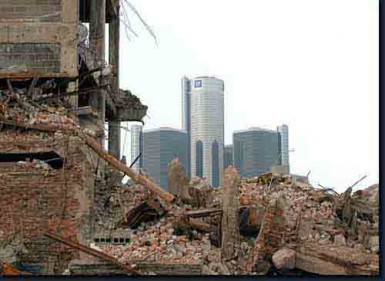
(2005: The Renaissance Center, home of the 2011 IT conference, rises behind the ruins of the Detroit Screw Works factory. Built in the aftermath of the 1967 riots that finished off the central city, the original design featured a gigantic concrete berm that sealed the complex off from the anarchy of the streets. Photo DetroitYes.)
It is snowing this morning in Washington. Half-hearted, perhaps, and it sticks at the moment only to the roofs and the cars in the lot far below. The numbers on the thermometer hover around 35, colder than Stockholm again, and it sucks.
Tropic dreams still possess me, the warmth of the moist gulf breeze still stirs my heart- and loins, for that matter, since the sensuality of the Keys is as unmistakable as it is irresistible. And now the last claws of winter rake that much more cruelly on the still-peeling skin of my back.
Crap. I wish I had sailed south from Key West and toward Ernie’s old haunts in Old Havana, and by the numbers, his refuge at Finca Vigia ten miles west. The limestone villa and grounds are a museum now for the Cuban people, and a tourist magnet that tugs at me.
Ernie’s fourth wife Mary, the one who awoke that morning in 1961 to the shotgun blast in the modern house in Ketchum, Idaho, wanted to have Pilar towed offshore and sunk in the deep water, but Cuban red tape- just as complex as that of Coleman Young’s junta in Detroit- did not make that possible.
Uncle Fidel decreed that the boat be restored, and it is now on a cradle on the tennis courts at “Lookout Farm.” Some people seem to have an instinct for saving things of worth, which is contrary to some places I can think of. In fact, I have been thinking about that a lot lately.
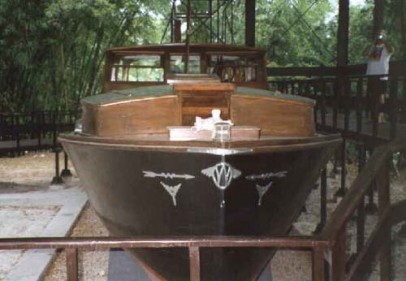
I can find no evidence that Ernie Hemingway did anything of significance in the Motor City. He must have passed through on the train, though, perhaps on his way to New York or to his short stints of employment in Toronto where he worked as a foreign correspondent for the Star and Star Weekly.
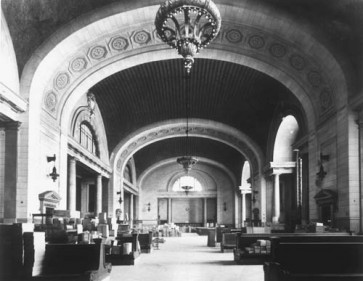
He doubtless would have seen the fabulous interior of Michigan Central, whose ruins are perhaps the most evocative of the destruction of the old city. That has been on my mind a lot, and the crowd at the convention was talking about it incessantly, since we are all headed for the city in only five weeks.
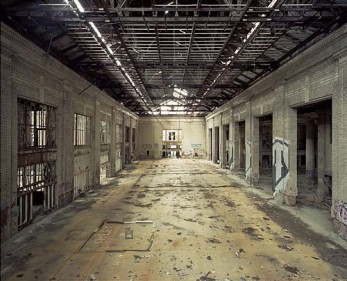
This year marks the end of the disbelief, I think, and will be the end of a lot of stuff. For one, the idea that the government has the discretionary funds to sponsor the travel and organizational costs of these conferences will clearly change. I remember when we crowded into smaller venues in the capital region, and industry was happy to attend to get access to the government officials.
We ever had a recession here in DC, since the collapse everywhere else just caused more government activity, and the wars made business good for the local hot-house military contractors.
Now, the big conferences have glamorous destinations for no discernable reason. We have been to Ernie’s Chicago for the big IT convention, and Phoenix last year. This next one in early May was supposed to be in Nashville, at Opryland or someplace, but the company that organizes these affairs for the government screwed up their negotiations and were suddenly without a destination.
Intense negotiations with the National Harbor people collapsed when the national convention of the Outback Steakhouse franchise sealed the deal first.
In desperation, the conference organizers turned to the only major venue that no one else wanted.
Detroit.
As I say, people have been joking about it sever since. “Oh, you going to the big IT conference? In Detroit?” Then the rolling of the eyes, or the protruding of the tongue in simulated disgust.
It is hard for a Detroit boy to take, and the news from he census people was just piling on the continuing train wreck that is- or was- my birth city.
The data that spewed out of the 2010 census made real the perceived collapse of Detroit, just when things might have been showing some signs of improvement- even the beginning of a minor Renaissance.
Since the millennial head count in 2000, Detroit’s population plunged by a full quarter, to 713,777. The news back in 2000, that what was once the fourth largest city in America no longer had a million residents was stark, but this is incredible news.
The Motor City is now smaller than Charlotte, NC, or Jacksonville, FL, or even San Jose, CA.
It is the smallest number of people who inhabit the 113 square miles of incorporated city in a hundred years, and according to the Times this morning, the most precipitous drop in American history for any city with more than 100,000 residents.
The slow-motion hurricane of the last decade has displaced more people than fled New Orleans after Katrina.
I have been advertising a great tour for the people going to the conference in May. I was going to include the refurbished Fox Theater, the lovely structure that featured in the Eminem Chrysler commercial that aired during the Super Bowl.
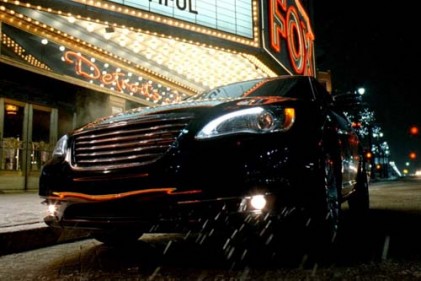
I was going to throw in Ford Field, and some of the remaining structures that transformed the world a century ago and were the arsenal of democracy that beat the Axis Powers.
I will try do the impact of the numbers for you, and lay out some of the fun things to do in the Motor City, but this is going to take some work. As we roll toward the town that put America on wheels over the next few weeks, I will try to put together an itinerary and some commentary that gives you an idea of what losing a war is like.
I mean, seriously, Berlin is OK today. And the residents of that fair city had to deal with the freaking Red Army.
Copyright 2010 Vic Socotra
www.vicsocotra.com
